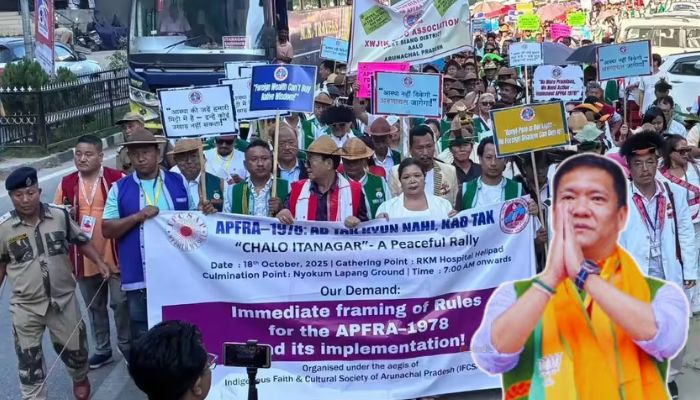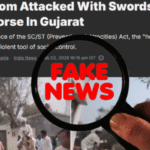In Arunachal Pradesh, a massive protest is ongoing as thousands of people from 27 districts, 26 major tribes, and 100 sub-tribes have taken to streets. The locals are demanding the immediate implementation of the Arunachal Pradesh Freedom of Religion Act (APFRA), 1978, a 46-year-old anti-conversion law.
On 20th October, Indigenous Faith and Cultural Society of Arunachal Pradesh (IFCSAP) organised a “Chalo Itanagar” rally in the capital city of Itanagar. Dressed in traditional attire, the protestors said that the increasing religious conversions are threatening traditional beliefs like Donyi-Polo. “Donyi” means sun and “Polo” means moon, symbolizing Arunachal Pradesh’s ancient faith. Besides Donyi Polo, Christianity and Hinduism, Arunachal Pradesh is also home to the followers of Mahayana and Theravada Buddhism.
🚨 Massive Unrest in Arunachal Pradesh, North East India 😳🔥
Huge protests rock Changlang, Arunachal Pradesh after reports claim illegal Rohingya migrants from Bangladesh have built colonies & mosques on government land ⚠️
Even the locals are shocked, demanding immediate… pic.twitter.com/fa0sMlLzJ7
— 𝐍𝐚𝐫𝐞𝐧𝐝𝐫𝐚 भारतीय 🌺🕉️ (@NarendraVictory) October 23, 2025
Dr. Amy Rumi, president of the organization, said that the Arunachal Pradesh Freedom of Religion Act was passed in 1978, just months after the first session of the Legislative Assembly. He said that the law also received the assent of the then President, however, till now the law has not been implemented.
“If this law is implemented, our culture, tradition, and religious identity will be protected,” Rumi said.

Addressing the protestors, lawyer R.S. Loda, said “We don’t want Arunachal Pradesh to lose its original identity like Mizoram or Nagaland, where local beliefs have been eroded by foreign religious propaganda.”

Those demanding implementation of the anti-conversion law in Arunachal Pradesh assert that the law is not against any religion, rather, it only protects “tribal communities from conversion through allurement or inducement”.
A delegation from the Indigenous Faith and Cultural Society of Arunachal Pradesh (IFCSAP) met with Home Minister Mama Natung, urging the immediate implementation of the Arunachal Pradesh Freedom of Religion Act, 1978 (APFRA). They submitted a memorandum pressing for the enforcement of the Act to safeguard the state’s indigenous faith, culture, and tribal identity.
The group said that protection of Arunachal’s tribal heritage is becoming increasingly urgent amid external influences and rising concerns over cultural erosion.
It is essential to note that there has been a significant increase in Christian population and conversion activities in the state over the years.

Alarmingly, the Christian population in Arunachal Pradesh has gone from 0.79% in the 1971 Census, to 30.26% in the 2011 Census. The share of Other Religions and Persuasions (ORP) in 1971 was 63.46% and in 2011 census, it was 26.20%.

The share of Hindu population in 1971 was 22% and in 2011 it was 29.04%. The Buddhis population in 1971 census comprised around 13% but in 2011, the share dwindled to 11.77%. Meanwhile, Muslims have gone from 0.18% in 1971 to 1.95% in 2011 census.

Christians oppose the APFRA law
Predictably, the Arunachal Christian Forum (ACF) is opposing the law and its president Tarh Miri argues that the “anti-conversion law violates religious freedom and targets Christians.” In February this year, the ACF had organised an 8-hour long hunger strike in protest against the anti-conversion law.
Earlier this year, Naga Baptist Church Council general secretary Rev Zelhou Keyho wrote a letter to Chief Minister Pema Khandu and claimed that APFRA is not intended to preserve traditional religion but to supress Christians.
“The real intention of the APFRA was not to preserve traditional religion but to suppress a particular religious group of those days… On the ground that the Act is unconstitutional, your people and the region stood to oppose the Bill… Looking at the present situation in the country, a lot has changed, and we know very well what will happen to your people, especially those of the Christian community in your state,” the letter read.
“We do not need to mention how the law (anti-conversion laws) is misused to unnecessarily persecute Christians in other parts of the country. Our common sense tells us that the same will happen to your peace-loving people, and this will spill over to the whole region,” it added.
Chief Minister Pema Khandu reaffirmed commitment to preserve indigenous faiths and traditions
In July this year, Arunachal Pradesh’s Chief Minister Pema Khandu reaffirmed the BJP government’s commitment to promote and preserve the indigenous faiths of the state. He called them the spiritual and cultural soul of the tribal communities.
The Chief Minister published an X post wherein he elaborated on why indigenous faiths are required to be preserved. He said that unlike major religions, indigenous faiths “don’t come from books, but from land, memory, and lived tradition. They are not exported, they are rooted. They hold the soul of our people, our forests, mountains, rivers, and ancestors.”
Why are Indigenous faiths so important to preserve, unlike major religions?
Because they don’t come from books, but from land, memory, and lived tradition. They are not exported, they are rooted. They hold the soul of our people, our forests, mountains, rivers, and ancestors.… pic.twitter.com/RVhXUdqVq4
— Pema Khandu པདྨ་མཁའ་འགྲོ་། (@PemaKhanduBJP) July 24, 2025
To promote and preserve native faiths, CM Khandu also announced 6 Indigenous Gurukuls for Adi, Galo, Nyishi, and Tangsa tribes, Honorarium to 3,000+ registered indigenous priests, Tribal Cultural Centres in all districts and 50 Indigenous Prayer Centres across the state.
In December 2024, CM Khand announced that the Department of Indigenous Affairs will now be renamed to include the words Indigenous Faith and Culture. He called it “a step forward in our commitment to preserving, promoting and protecting the rich heritage of indigenous traditions.”
Indigenous faiths have been an integral part of humanity since time immemorial, even before the advent of organized religions. I am delighted to announce that the Department of Indigenous Affairs will now be renamed to include the words Indigenous Faith and Culture, a step… pic.twitter.com/TfIoeF54dh
— Pema Khandu པདྨ་མཁའ་འགྲོ་། (@PemaKhanduBJP) December 27, 2024
Arunachal Pradesh Freedom of Religion Act
The Arunachal Pradesh Freedom of Religion Act came into existence in October 1978 to “provide for prohibition of conversion from one religious faith to any other religious faith by use of force or inducement or by fraudulent means and for matters connected therewith.”
The legislation, which received the assent of the President of India, was aimed to protect indigenous religions, beliefs and practices.
It identified several ‘indigenous Faiths’ including Buddhism (practiced by the Monpas, Membas, Sherdukpens, Khambas, Khamptis and Singphos), Vaishnavism (practised by Noctes), Akas and Nature worshippers (including worshippers of Dunyi-Polo).
Section 3 of the Arunachal Pradesh Freedom of Religion Act clearly says – “No person shall convert or attempt to converts, either directly or otherwise, any person from one religious faith to any other religious faith by the use of force or by inducement or by any fraudulent means nor shall any person abet any such conversion.”
The law further states that anyone found violating Section 3 would be liable to a fine of up to ₹10,000 and punished with maximum imprisonment of up to 2 years.
It also mandates imitating the Deputy Commissioner of the particular district (in Arunachal Pradesh) about the conversion of an individual from a religious faith to another. Failure to do so is punishable with imprisonment of up to 1 year and a fine of up to ₹1000.
“An offence under this Act shall be cognizable and shall not be investigated by an officer below the rank of an Inspector of Police,” states Section 6 of the legislation.
Meanwhile, the law also states categorically that prosecution under the Act needs prior sanction from the Deputy Commissioner of police or authorisation from an officer now below the rank of Extra Assistant Commissioner.

A Public Interest Litigation (PIL) was filed in the Gauhati High Court seeking the enactment of rules by the government of Arunachal Pradesh for the implementation of the anti-conversion law. The major breakthrough in the case came in September 2024.
A 2-judge Bench of Justices Kardak Ete and Budi Habung closed the PIL after examining the response of Advocate General I. Choudhury, who pointed out that it would require 6 months for the government to frame rules.
“We expect the concerned authorities to be mindful of their obligations and the draft rules would be finalized within a period of 6(six) months from today,” the Guwahati High Court noted in its order on 30th September 2024.
Notably, CM Khandu has already clarified that following the direction of the Guwahati High Court, the government is supposed to prepare the draft rule within six months. This deadline is ending this month (October 2025).
It is paramount that the state government enact the APFRA or anti-conversion law to protect the religious demography and preserve indigenous faiths and traditions. While Christian groups are seeing the law as an attack on their religious identity, the APFRA if and when implemented will only be against conversions to Christianity carried out either forcefully or for any sort of allurement.












